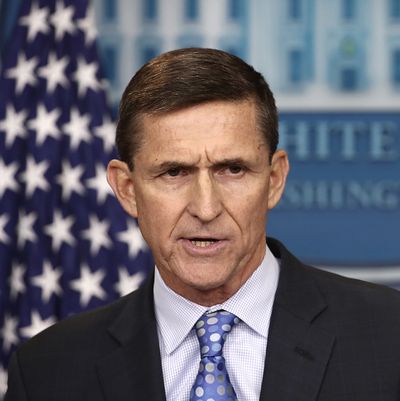
Another confusing, though predictable, layer was added to the saga of National Security Adviser Michael Flynn’s firing on Thursday when reports said he denied to FBI investigators that he discussed sanctions with Russia’s ambassador to the U.S. in December, though intercepted communications show that he did. It’s unclear if Flynn’s sanctions talk violates an obscure law banning private citizens from negotiating with foreign governments, but lying about it to the FBI is definitely a felony offense.
So why is CNN reporting that the FBI isn’t expected to pursue charges against Flynn? It appears Flynn may avoid legal trouble thanks to his faulty memory, and misunderstanding of what “sanctions” means. According to CNN, during a January 24 interview with the FBI, Flynn backtracked when pressed on whether he discussed sanctions. Interviewers believe he was legitimately unsure of what he said:
Flynn initially told investigators sanctions were not discussed. But FBI agents challenged him, asking if he was certain that was his answer. He said he didn’t remember.
The FBI interviewers believed Flynn was cooperative and provided truthful answers. Although Flynn didn’t remember all of what he talked about, they don’t believe he was intentionally misleading them, the officials say.
Flynn used the same tactic when responding to the February 9 Washington Post story that revealed he discussed sanctions during the calls. When asked if the topic came up, he initially said “no” twice. Then a spokesman walked that back saying Flynn “indicated that while he had no recollection of discussing sanctions, he couldn’t be certain that the topic never came up.”
The Post reported on Thursday that several officials said it would be difficult to bring a case against Flynn for misleading the FBI because he might parse the meaning of the word sanctions. In an interview with the Daily Caller hours before his resignation, Flynn insisted that he merely discussed reviewing the Obama administration’s expulsion of 35 Russian diplomats, not sanctions. The expulsion of the alleged Russian intelligence operatives was part of the sanctions package imposed over Russia’s suspected meddling in the U.S. election. From the Daily Caller:
Flynn insisted that he crossed no lines in his telephone conversation with Russian Ambassador Sergey Kislyak: “If I did, believe me, the FBI would be down my throat, my clearances would be pulled. There were no lines crossed.”
Flynn said there was a brief discussion of the 35 Russian diplomats who were being expelled by Obama in retaliation for Moscow’s alleged interference in the 2016 campaign.
“It wasn’t about sanctions. It was about the 35 guys who were thrown out,” Flynn said. “So that’s what it turned out to be. It was basically, ‘Look, I know this happened. We’ll review everything.’ I never said anything such as, ‘We’re going to review sanctions,’ or anything like that.”
Flynn said in his resignation letter that he “inadvertently” gave Vice-President-elect Mike Pence and others “incomplete information” about his calls with the Russian ambassador. But apparently Trump is less forgiving of Flynn’s memory troubles than the FBI — even though the White House has maintained that there’s nothing wrong with Flynn talking sanctions with Russia before he was sworn in.
At Thursday’s press conference, President Trump said Flynn had to go because he either lied or misremembered the perfectly appropriate topics that were discussed with the Russian ambassador when he was briefing Pence.
The thing is, he didn’t tell our vice president properly, and then he said he didn’t remember. So either way, it wasn’t very satisfactory to me. And I have somebody that I think will be outstanding for the position. And that also helps, I think, in the making of my decision.
But he didn’t tell the vice president of the United States the facts. And then he didn’t remember. And that just wasn’t acceptable to me.
The White House has yet to clarify why President Trump only decided Flynn had to go when the story went public, since he’d known that Flynn gave Pence an inaccurate account for two weeks before that. Vague as it is, Trump’s defense of Flynn is the strongest indicator that the ex–national security adviser won’t face charges. Attorney General Jeff Sessions has the final say over prosecutions by the Justice Department, and it seems unlikely that he’d charge Flynn over Trump’s objections.
Still, Flynn’s troubles might not be over. House Intelligence Committee Chairman Devin Nunes initially suggested he was only interested in probing the intelligence community’s leaks regarding Flynn, not their content. But on Thursday Nunes signaled that he’s open to expanding the House Intelligence Committee’s ongoing probe of Russia’s election interference to include other allegations about the Trump team’s contacts with Russia. Democratic senators Dianne Feinstein and Mark Warner, who are both on the Senate Intelligence Committee, praised Chairman Richard Buff for proceeding “very aggressively” with their corresponding probe.
The House Oversight Committee is also looking into Flynn’s activities, with chairman Jason Chaffetz joining Representative Elijah Cummings, the committee’s ranking Democrat, in requesting more information on Flynn’s 2015 trip to Moscow.
Cummings also revealed on Thursday that the first Republican, Representative, Walter Jones, has signed on to a bill backed by all Democrats to establish an independent commission to investigate all of the allegations surrounding Russia’s involvement in the U.S. election and ties to the Trump campaign. “Hopefully this is going to open the door, and some Republicans will begin to join us on that,” Cummings told MSNBC.






























